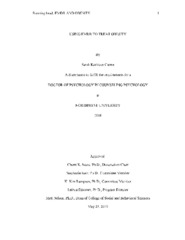| dc.contributor.author | Cairns, Sarah | en |
| dc.date.accessioned | 2018-06-19T18:48:14Z | |
| dc.date.available | 2018-06-19T18:48:14Z | |
| dc.date.issued | 2018 | en |
| dc.identifier.uri | archives.northwestu.edu/handle/nu/31704 | |
| dc.identifier.uri | archives.northwestu.edu/handle/nu/31704 | en |
| dc.description.abstract | Research has supported a correlation between early childhood trauma and obesity in adulthood. Currently, there are no mainstream treatments that treat obesity through an etiological focused methodology. This pilot study explores the usefulness of EMDR to treat early childhood trauma in adults who are currently obese in order to decrease maladaptive food behaviors. The dual hypothesis of the study is; obese adults who experienced childhood trauma and who undergo EMDR therapy will experience a decrease in maladaptive food behaviors as measured by (a) a decrease in the global score of the EDE-Q 6.0; and (b) experience a decrease in maladaptive food behaviors as measured by a decreased score on the EDE-Q 6.0 eating concerns subscale. The results of the study showed a decrease in maladaptive eating behaviors across all participants on both scores. These findings suggest that further research is warranted on EMDR as a treatment for obesity. | en |
| dc.format.extent | 82 pages | en |
| dc.format.medium | PDF | en |
| dc.language.iso | en | en |
| dc.publisher | Northwest University | en |
| dc.rights | This original work is protected by copyright. Copyright is retained by the author(s). Works may be viewed, downloaded, or printed, but not reproduced or distributed without author(s) permission. | en |
| dc.rights.uri | http://archives.northwestu.edu/page/copyright | en |
| dc.title | Using EMDR to Treat Obesity | en |
| thesis.degree.name | Doctor of Psychology in Counseling Psychology | en |
| thesis.degree.level | Doctoral | en |
| thesis.degree.grantor | Northwest University | en |
| thesis.degree.discipline | College of Social and Behavioral Sciences | en |


 Maintained by the Northwest University Library
Maintained by the Northwest University Library